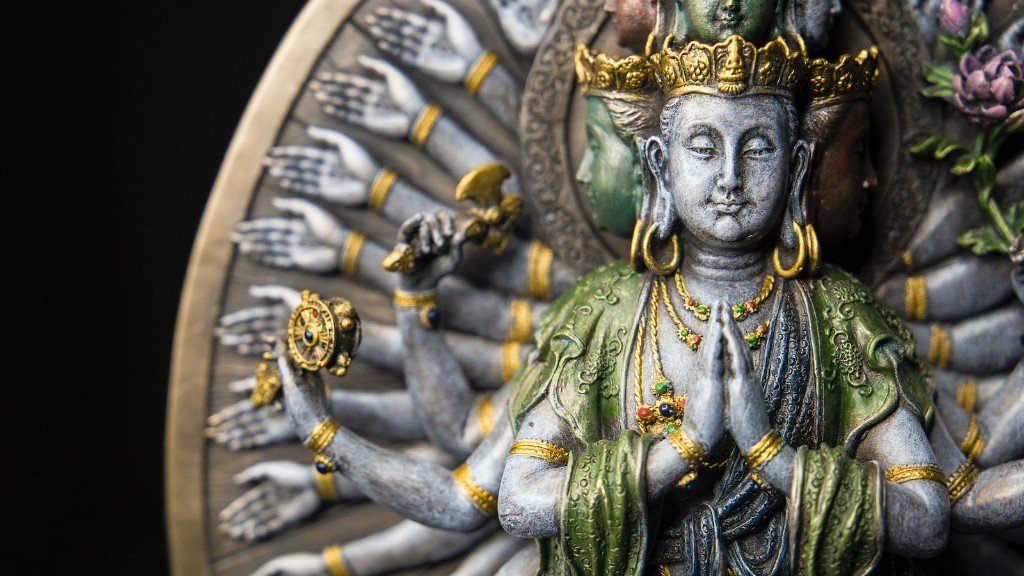Buddhism is an ancient religion founded by Siddhartha Gautama—the ‘Awakened One’—over 2500 years ago in the Indian Subcontinent. Although Buddhism is unique in its core doctrines and philosophical understanding of the universe, it has nevertheless been deeply influenced by the dominant religion of the region—Hinduism. Buddhism and Hinduism share some similarities and a long history of interconnectedness. But is Buddhism a part of Hinduism?
According to scholars, it is difficult to answer this question definitively as both religions have evolved over the centuries and their relationship has been shaped by regional and historical context. They share many ideas, symbols, language and concepts. While both religions emphasize the importance of meditation, recite mantras and follow virtuous behavior; they also differ in their paths to liberation from the cycle of death and rebirth. For example, Buddhism places more emphasis on meditation and mindful contemplation as the main path to enlightenment, while Hinduism is a multi-strategy faith with elements of personal devotion, astrology, mythology and a wide array of philosophical principles. Hinduism also teaches that the soul can be re-incarnated in a different form, while Buddhism teaches that the cycle of re-birth can be broken.
The relationship between the two religions is complex and varied. Some scholars hold the view that Buddhism was initially an offshoot of Hinduism, a view which has been supported by the presence of Dharma and Vedic motifs in Buddhist art, literature and ritual practices. On the other hand, some scholars assert that Buddhism is non-Hindu and unique in its own right. Although modern Hinduism has been diligently studied and codified since the 19th century, many ancient texts and stories remain ambiguously intertwined. For example, there is debate over whether Gautama Buddha was an avatar of Vishnu or whether they existed at different points in time. In the debate over whether Buddhism is part of Hinduism or a separate religion in its own right, there is still much ambiguity.
Furthermore, the variety of Buddhist and Hindu traditions in South and Southeast Asia means that the relationship between Buddhists and Hindus vary from region to region. In Nepal and some parts of India, Buddhists and Hindus have traditionally worshipped at the same shrines, shared Tibetan cultural practices and adopted a transactional approach to ritual services, blurring the boundaries between their respective religions. In other parts of India and countries like Thailand, Laos and Vietnam, distinct religions have evolved with limited influence from each other.
Despite these complexities, there is consensus among scholars that Buddhism and Hinduism are two distinct religions, with different creeds, practices, rituals and beliefs systems. At the same time, there is a deep-rooted respect for each other’s beliefs in both Hindu and Buddhist cultures, leading to frequent intermingling of the symbology and philosophy of both religions. It is believed that this mutual respect has evolved from the long-term interrelation between the two faiths. Ultimately, what we can say for certain is that Buddhism and Hinduism are deeply connected but remain separate religions.
History Of Hinduism And Buddhism
The history of Hinduism and Buddhism can be traced back to the Vedic period of India, some 5000 years ago. Hinduism originated in the form of ancient Vedic beliefs and evolved into a sophisticated philosophical system, while Buddhism emerged from an amalgamation of various religious traditions and beliefs in the region. Although Hinduism is the dominant religion in India and Nepal, Buddhism has its own set of devotees across the region. Both religions spread their influence through different regions of India and eventually the rest of the world.
Hinduism has traditionally been organized around a pantheon of gods and goddesses, while Buddhism is based upon the teachings of the Buddha and emphasizes the importance of meditation and mindful contemplation. Despite these differences, the two faiths are connected by common beliefs and values. For example, both religions stress the importance of dharma, or duty to uphold morality and social order, and share the belief that karma and the cycle of rebirth determine one’s fate in this life and the next. While Hinduism believes in gods and goddesses, Buddhism does not recognize any singular deity.
Both religions have an ancient history of interpenetration between their practices, rituals and beliefs. This is evident in the prevalence of Hindu motifs and symbols found in Buddhist art, literature and ritual practices. In addition, Buddhist notions of non-attachment and inner peace echoed the ancient Hindu tradition of seeking detachment from the material world and understanding the true nature of the universe.
Influence Of Hinduism On Buddhism
Hinduism has had a profound influence on Buddhism and vice versa. It is believed that Buddhism was initially an offshoot of Hinduism, yet evolved over time into an entirely distinct religion. In terms of religious beliefs and practices, Hinduism has had a significant influence on certain aspects of Buddhism, particularly in its early days. For example, the notion of Dharma, which is central to Hinduism, has had a strong influence on Buddhist understandings of morality and responsibility. The concept of karma, the idea that our actions have consequences, is common to both faiths and has been shaped by the influence of Hinduism on Buddhism.
The influence of Hinduism on Buddhism is also present in the rituals and symbols associated with Buddhist practices. Many of the symbols used in Buddhism—such as the Bodhi tree and the dharmaraksha—can be traced to ancient Hindu myths and legends. In addition, some of the terms used in Buddhist literature, such as Nirvana, Dharma and Sutra, are derived from Sanskrit, the language of Hinduism.
The relationship between Hinduism and Buddhism has shifted over the centuries. While Hinduism has had a significant influence on Buddhism in its early days, this influence has diminished in more recent times. Despite this, there is still a strong connection between the two faiths, particularly in the shared belief of karma and the cycle of rebirth. Both religions continue to be influential in India and other parts of Asia, and their intertwining relationship has helped shape the history of the region.
Modern Relationship Between Hinduism And Buddhism
The relationship between Hinduism and Buddhism continues to be complex and varied. Although both religions share certain philosophies and symbolism, they remain distinct and unique in their respective beliefs and practices. The Hindu-Buddhist relationship depends on the region and context, with some parts of India and Southeast Asia influenced more by Hinduism and others more by Buddhism.
In any case, both religions remain influential in Asia and continue to be respected and celebrated by many. The two religions have maintained a respectful and peaceful relationship, contrary to other religious traditions which have often engaged in hostile confrontations. This has enabled the two faiths to live harmoniously and grow in mutual understanding over the centuries.
In recent years, Hinduism and Buddhism have co-existed peacefully and even thrived due to their mutual respect and understanding of each other. This relationship has allowed some of the most iconic achievements—in terms of art, literature and philosophy—to be jointly shared between the religions. In essence, Hinduism and Buddhism are two distinct religions, yet remain deeply intertwined in history and in the present day.
Developments In Hinduism And Buddhism
The relationship between Buddhism and Hinduism has been dynamic and evolving. In recent times, there have been various developments in both religions which have had far-reaching implications. Firstly, the advent of Hinduism in the West and the popularization of various forms of yoga, meditation and mindful practices, has had a significant impact on the Buddhist faith. This has enabled people in the West to more easily adopt various Buddhist practices and form a connection with the faith.
In India, Buddhism has experienced a revival in recent decades, with the number of Buddhists in the country increasing significantly. The rise of Buddhist monasteries, monuments and shrines across India has allowed Buddhism to reassert its presence in the region. The spread of Buddhism within India has been facilitated by a renewed interest in the faith from both Indian and foreign devotees.
Another key development has been the rise of interfaith dialogue and interreligious exchange between Hindu and Buddhist communities. This has been a positive development as it has enabled both religions to foster a better understanding of each other and to appreciate the beauty and wisdom each religion has to offer.
Impacts Of Hinduism And Buddhism
Hinduism and Buddhism have had a significant influence on various aspects of Asian culture and society. Both religions have served as important spiritual and philosophical foundations for many of the region’s most influential artworks, literature, rituals and monuments.
The two faiths have also provided a moral compass for many people in the region, with Hinduism’s emphasis on virtuous behavior and Buddhism’s stress on mindful contemplation. Further, they have enabled people to appreciate the beauty of diversity and push back against religious and cultural intolerance.
At a broader level, the long-term relationship between Hinduism and Buddhism has helped shape the culture, philosophy and religion of the region. The two faiths have provided a sense of unity and identity for those living in the Indian sub-continent and other Asian countries, allowing the region to grow and thrive in the face of adversity.




